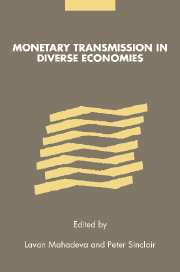Book contents
- Frontmatter
- Contents
- List of figures
- List of tables
- List of contributors
- Acknowledgements
- URL disclaimer
- 1 Introduction: the transmission mechanism and monetary policy
- 2 Are the effects of monetary policy in the euro area greater in recessions than in booms?
- 3 Supply shocks and the ‘natural rate of interest’: an exploration
- 4 Some econometric issues in measuring the monetary transmission mechanism, with an application to developing countries
- 5 Central bank goals, institutional change and monetary policy: evidence from the United States and the United Kingdom
- 6 The transmission mechanism of monetary policy near zero interest rates: the Japanese experience, 1998–2000
- 7 What does the UK's monetary policy and inflation experience tell us about the transmission mechanism?
- 8 Modelling the transmission mechanism of monetary policy
- 9 Empirical evidence for credit effects in the transmission mechanism of the United Kingdom
- 10 Uncovered interest parity with fundamentals: a Brazilian exchange rate forecast model
- 11 Uncovered interest parity and the monetary transmission mechanism
- Bibliography
- Index
11 - Uncovered interest parity and the monetary transmission mechanism
Published online by Cambridge University Press: 22 September 2009
- Frontmatter
- Contents
- List of figures
- List of tables
- List of contributors
- Acknowledgements
- URL disclaimer
- 1 Introduction: the transmission mechanism and monetary policy
- 2 Are the effects of monetary policy in the euro area greater in recessions than in booms?
- 3 Supply shocks and the ‘natural rate of interest’: an exploration
- 4 Some econometric issues in measuring the monetary transmission mechanism, with an application to developing countries
- 5 Central bank goals, institutional change and monetary policy: evidence from the United States and the United Kingdom
- 6 The transmission mechanism of monetary policy near zero interest rates: the Japanese experience, 1998–2000
- 7 What does the UK's monetary policy and inflation experience tell us about the transmission mechanism?
- 8 Modelling the transmission mechanism of monetary policy
- 9 Empirical evidence for credit effects in the transmission mechanism of the United Kingdom
- 10 Uncovered interest parity with fundamentals: a Brazilian exchange rate forecast model
- 11 Uncovered interest parity and the monetary transmission mechanism
- Bibliography
- Index
Summary
Introduction
The exchange rate is a key transmission channel for monetary policy in conventional macro models that assume flexible exchange rates. Particularly since the work of Dornbusch (1976), the link between exchange rates and monetary policy in such models has been increasingly embodied in the uncovered interest parity (UIP) condition. Under UIP, the expected change in the exchange rate equals the interest rate differential between domestic and foreign assets. This establishes a simple and transparent link between monetary policy actions – as reflected in interest rate movements – and the exchange rate.
Although attractive from a theoretical viewpoint, there are two issues that need to be addressed in implementing the conventional framework. The first is the awkward fact that the existence of UIP has been resoundingly rejected in empirical studies, as documented in a vast literature. At face value, the empirical failure of UIP calls into question the specification of the exchange rate transmission channel in conventional models. Is there a way of explaining this empirical failure that can rescue the conventional means of specification?
The second issue involves interpreting the role of the exchange rate as a monetary transmission channel, even if UIP holds. UIP specifies only the relationship between the expected future change in the exchange rate and the current interest differential between domestic and foreign assets. Holding the expected future value of the exchange rate constant, a rise in the domestic interest rate, under UIP, would lead to an appreciation of the domestic currency.
- Type
- Chapter
- Information
- Monetary Transmission in Diverse Economies , pp. 208 - 236Publisher: Cambridge University PressPrint publication year: 2002
- 1
- Cited by



